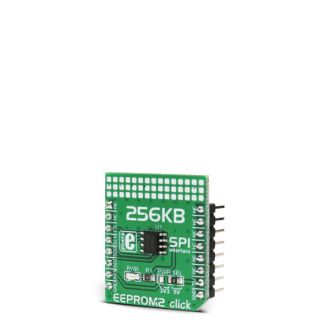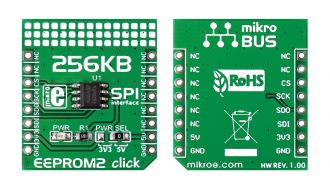
We strongly encourage users to use Package manager for sharing their code on Libstock website, because it boosts your efficiency and leaves the end user with no room for error. [more info]

Rating:
Author: MIKROE
Last Updated: 2018-03-19
Package Version: 1.0.0.1
mikroSDK Library: 1.0.0.0
Category: EEPROM
Downloaded: 6875 times
Followed by: 5 users
License: MIT license
EEPROM 2 click carries ST’s M95M02 DIP-8 socket EEPROM chip with 256 KB of memory. The board communicates with the target MCU through the mikroBUS SPI interface (CS, SCK, MISO and MOSI pins) with speeds up to 5 MHz. This example demonstrates how the EEPROM 2 click works.
Do you want to subscribe in order to receive notifications regarding "EEPROM 2 Click" changes.
Do you want to unsubscribe in order to stop receiving notifications regarding "EEPROM 2 Click" changes.
Do you want to report abuse regarding "EEPROM 2 Click".


Library Description
This library provides generic functions enough to have complete control over the EEPROM 2 click board.
Key functions:
Examples Description
The application is composed of three sections:
void applicationTask()
{
eeprom2_memoryEnable();
eeprom2_writeBytes(0x01, &text[0], 6);
mikrobus_logWrite("Writing Mikroe to EEPROM 2 click", _LOG_LINE);
Delay_ms(1000);
eeprom2_readBytes(0x01,&memValue[0],6);
mikrobus_logWrite("Data read:", _LOG_LINE);
mikrobus_logWrite(memValue, _LOG_LINE);
Delay_ms(1000);
}
Other mikroE Libraries used in the example:
Additional notes and information
Depending on the development board you are using, you may need USB UART click, USB UART 2 click or RS232 click to connect to your PC, for development systems with no UART to USB interface available on the board. The terminal available in all MikroElektronika compilers, or any other terminal application of your choice, can be used to read the message.